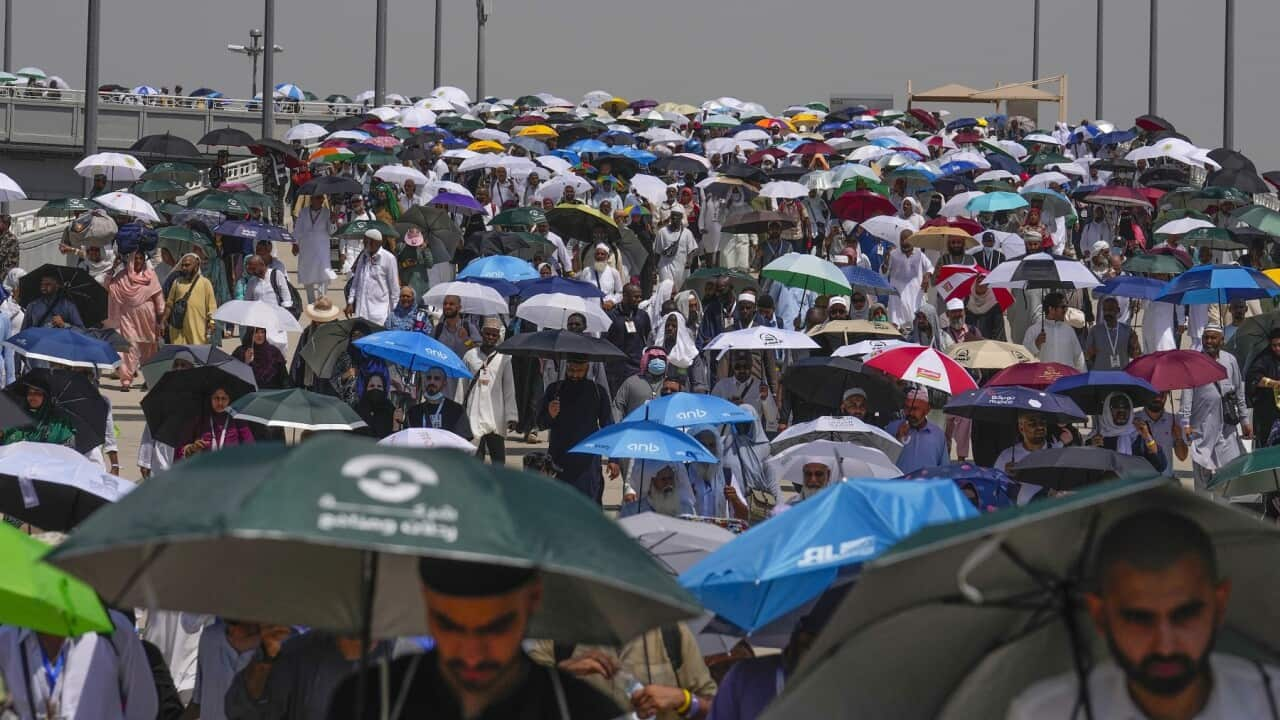TRANSCRIPT
The Hajj is considered one of the most significant annual landmarks for the Muslim community.
During this time of year, people make their pilgrimage to the Kaaba, also known as the House of Allah, which is located in the Saudi Arabian city of Mecca, considered holy ground for those of the Islamic faith.
But this year, things have gone terribly wrong due to the unexpectedly high temperatures affecting the region.
At least 1,300 people have already died making their way to Mecca, with local authorities expressing concerns that number could rise.
Saudi health minister Fahad Al-Jalajel says the majority of those who died were unregistered travellers.
"While the number of deaths reached 1,300, and may God have mercy on them all and forgive them, 83% of them were unauthorized. Those who were exposed to the long-distance elements I mentioned previously and were under the sun without shelter."
Temperatures in the area have at times exceeded 50 degrees Celsius, making this year's pilgrimage extremely dangerous.
The official Saudi news agency SPA has said people walked for hours under direct sunlight without enough protection from the heat.
Saudi health facilities have treated almost half a million people, with the local Health Ministry trying to raise awareness over the dangers of extreme heat.
American Saida Wurie has told CNN her parents are among the dead.
"Someone from the US embassy did advise that natural causes could have been due to a heat stroke. Honestly, I don't think that they were properly prepared for this trip. There was a group of them, maybe up to a 100 people that were travelling under a certain agency. They saved their entire lives to embark on this journey. And they didn't receive the proper preparation, the proper documents. It was just a nightmare overall."
But this year's participation in the Hajj has reached record numbers, with people gathering from across several nations majorly populated by members of the Muslim faith.
Saudi authorities say 1.8 million pilgrims have taken part in the Hajj.
Speaking to French media outlet France 24, Muslim pilgrim Rasid Saeed has described the situation as an act of wilful negligence.
"People are dying, hundreds of people I saw. I saw hundreds of people are dying on the track. But nobody is picking up the dead bodies. They say there is no ambulance. It's a murder. It's a murder of 500 people."
The deaths had been independently reported by each of the nations who saw people travel to Saudi Arabia to take part in the pilgrimage.
Indonesia said over 200 of its nationals had been killed, while India reported a further 98 deaths.
Pakistan, Malaysia, Jordan, Iran, Senegal and other nations have also reported casualties.
Dr Ather Hussein, who is currently in Mecca, has told the B-B-C that the conditions in the area this year were almost suffocating.
"For me, a person who has visited this blessed city for over 33 years, I have never seen such extreme heat and conditions. We saw people every 50 yards struggling with the heat, full of perspiration, We found that it was difficult for the old, for the frail, and indeed for the fit and healthy as well."
Saudi Arabian authorities remained silent on the number of dead until Sunday night.
They have received heavy criticism from other nations for not doing enough to protect the pilgrims from the heat and difficult circumstances of the journey.
Saudi officials say they had removed hundreds of thousands of unauthorised pilgrims from Mecca, adding that the number of those who made the journey illegally is too large to keep track of.
Many pilgrims attempt to participate in the Hajj without acquiring a permit due to its hefty cost, with the price tag sitting at around $450.
Samer Bagaeen, Professor of Planning and Resilient Systems at Kent University as told German news outlet Deutsche Welle [[doy-tchuh vell-uh]] says the local infrastructure could also have played its part in the tragedy.
"I think the other issue, which is probably a lot more serious, is the nature of the urban infrastructure that then surrounds anyone going to Hajj. And that could include anything from streets to... I mean, we've seen pictures of fountains of (people) drinking water. But actually, when you have a combination of heat and so many people, you have millions and millions of people on the spot, you need a different scale of infrastructure. You need a different scale of measures. And also, you need an urban environment that actually makes people safe. And it looks like what has happened in this case (is) a combination of things not working well in the urban environment. And the high heat actually creating a situation where loss of life was inevitable."
The fallout from the large number of casualties is ongoing.
Egyptian Prime Minister Mostafa Madbouly has removed the licenses of 16 tourism companies who illegally enabled people to take the pilgrimage, referring their managers to prosecutors.
In Jordan, several travel agents who aided people to make the journey to Mecca illegally were immediately detained.
Meanwhile, in Tunisia, religious affairs minister Brahim Chaibi has been removed from his position by the country's president, Kais Saied.













